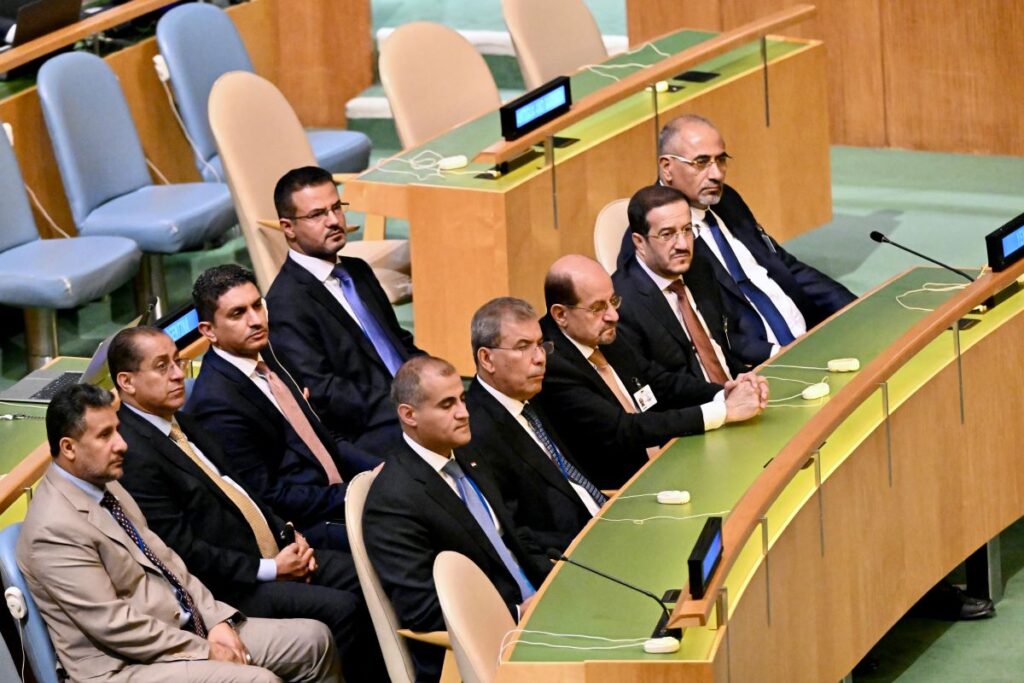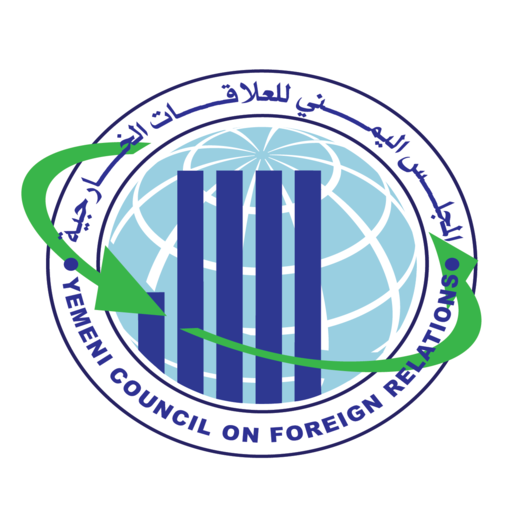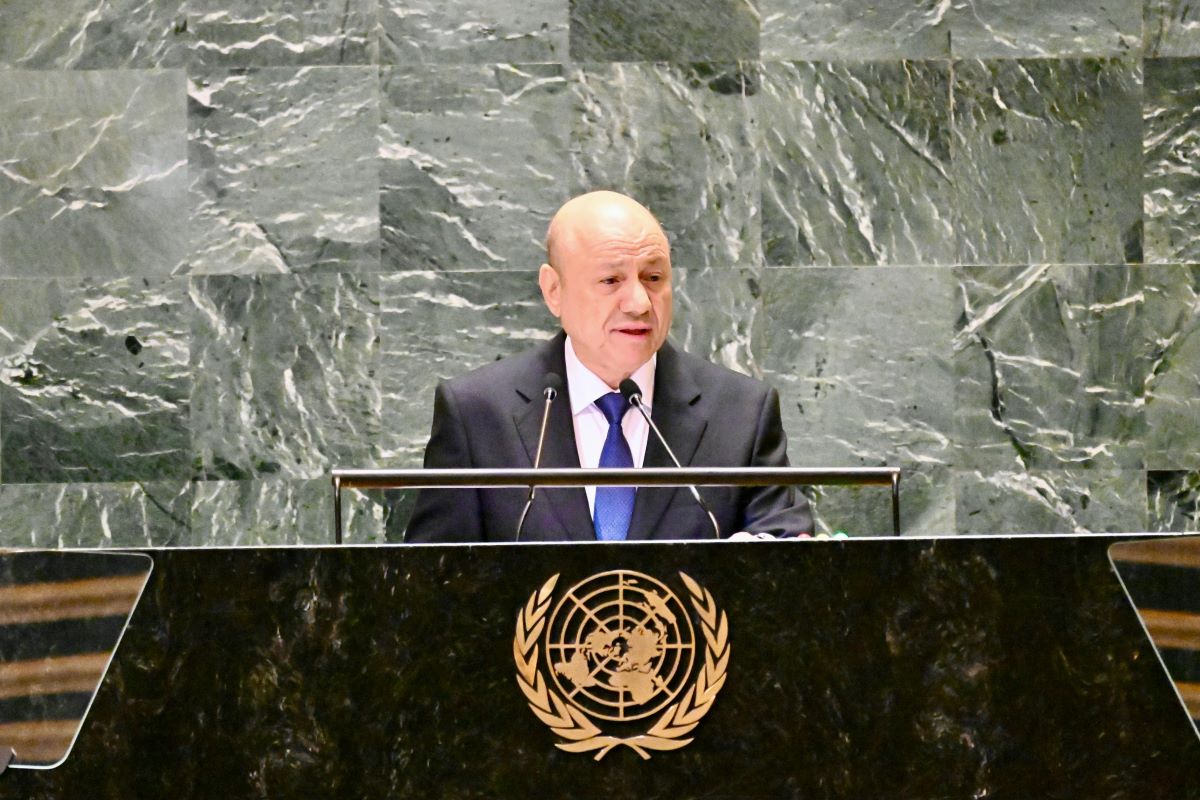Source: The official website of President Dr. Rashad Al-Alimi
His Excellency President Dr. Rashad Mohammed Al-Alimi, President of the Presidential Leadership Council, said that the path to regional peace begins with supporting the national states that are members of the United Nations, and the moderate forces in the region led by the Kingdom of Saudi Arabia. It also begins with adopting an integrated deterrence strategy against militias and terrorist organizations.
In a speech before the 79th session of the United Nations General Assembly, the President of the Presidential Leadership Council called for a collective international approach to support the Yemeni government and enhance its institutional capabilities in protecting its territorial waters and securing its entire national territory.
The President renewed the government’s commitment to a comprehensive and just peace approach in accordance with its national, regional and international references. But he stressed the need to strengthen the government’s position to confront any other options, given the continued escalation of the Houthi militias at the local and regional levels.
His Excellency warned that the continued leniency of the international position towards these militias as it is today, portends a greater threat to international security and peace.
He added, “To prevent the expansion and sustainability of this escalation, there is an urgent need for a collective approach to support the Yemeni government and enhance its institutional capabilities to protect its territorial waters and secure its entire national territory.”
The President stressed that without addressing these needs and implementing the relevant international legitimacy resolutions to ban the flow of Iranian weapons and dry up sources of funding, the militias will not engage with any efforts to achieve comprehensive and just peace. They will not stop their methods of blackmailing the regional and international communities.
The President of the Presidential Leadership Council expressed his gratitude, along with his fellow Council members and the government, for the unity of the international community and its supportive stance toward Yemen and its people. However, he called for this position to be transformed into actions and measures that align with the magnitude of the threats facing our country, our region, and international peace and security.
His Excellency stated that history teaches us that leniency with the enemies of peace is the beginning of the most heinous, costly and complex wars.
He explained that “despite the truce agreed upon by the government in April 2022, the militias continued their military violations and gross violations of human rights and national and international laws.”
In this context, he pointed out that the Houthi militias bombed the oil export ports in Hadhramaut and Shabwa governorates in October 2022, which deprived the Yemeni people of the revenues needed to pay salaries and basic services, exacerbated human suffering, and caused the national currency to deteriorate to unprecedented levels.
The President also pointed out that the Yemeni government has frozen its recent decisions regarding the transfer of bank headquarters from Sana’a, which is under the control of the militias, to the interim capital, Aden, in response to the request of the United Nations and the international community to de-escalate. Provided that the Houthis participate in serious talks to address the economic crises, especially the currency crisis, in an effort to revive peace efforts under a roadmap mediated by our brothers in the Kingdom of Saudi Arabia and the Sultanate of Oman.
He added: “However, the militias responded by seizing three aircrafts of Yemenia Airlines, attacking the “Safer” oil facility in Marib Governorate with drones, and issuing racist laws and regulations to concentrate public office in a specific category of its loyal militants, most notably the judiciary. This indicates more expected repressive measures against public freedoms and civil work.”
The President of the Presidential Leadership Council stressed that the continuation of this pattern of reckless escalation in response to the calm and initiatives presented by the government for more than two decades requires the international community to adopt firm policies to push the militias towards peace efforts in accordance with their international references, especially Resolution 2216, instead of their absurd escalation.
In his speech, the President of the Presidential Leadership Council touched upon the Houthis’ gross violations of human rights, including the recent arrests of dozens of United Nations staff, to be added to the thousands of innocent women, children, youth, and the elderly who have been missing in its prisons for years. Most notably the struggler Mohammed Qahtan, who is included in the UN Security Council resolution.
He also addressed the repercussions of the Houthi militias’ continued escalation of their terrorist attacks on global trade in the Red Sea and the surrounding waterways.
He stressed that the Houthi militias today pose an increasing threat not only to the Yemeni interior, as some believed a decade ago, but also to the stability of the entire region, and the safe flow of international trade exceeding a trillion dollars. Today they are strengthening their position as the first rebel group in history to use ballistic missiles and drones against civilian commercial ships.
The President of the Presidential Leadership Council presented the chronic economic challenges that were exacerbated by the terrorist Houthi attacks on oil facilities. He noted that the economic war waged by the militias is part of a broader hostile strategy aimed at weakening the government’s ability to provide basic services and pay public sector salaries, which further exacerbates the humanitarian crisis for more than 14 million Yemenis.
He considered Yemen’s recovery not just a national issue, but a regional and global need, as its stability is crucial to maintaining peace, regional security, and trade routes in the Red and Arab seas, and surrounding waterways including the Suez Canal.
He considered that the path to peace must pass through supporting the efforts of the moderate forces in the region, led by the Kingdom of Saudi Arabia, which, along with our brothers in the Coalition to Support Legitimacy, hold the responsibility of defending international resolutions, extended a helping hand, and opened its doors to receive millions from countries of wars and armed conflicts.
On the national level, the President of the Presidential Leadership Council reiterated that the brutal Israeli war on the Palestinian people must stop immediately, because that is the key to the desired peace and an entry point to lift the cover from Iran’s pretexts and its agents to exacerbate the situation in the region.
He stressed that the way to end the suffering of the Palestinian people must be based on implementing international legitimacy resolutions and relevant references, especially the Arab Peace Initiative.
He said, “As is the case with the Yemeni and Palestinian cases, the only way to deter the brutal Israeli aggression on Lebanon will be through a firm position from the international community, the unity of the Lebanese themselves, the independence of their decision, and non-interference in their country’s internal affairs.


